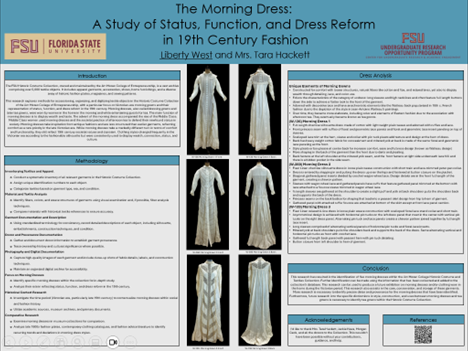Research Symposium
25th annual Undergraduate Research Symposium, April 1, 2025
Liberty West Poster Session 3: 1:45 pm - 2:45 pm/ Poster #168

BIO
Liberty is an undergraduate student at Florida State University pursuing a dual degree in anthropology and art history with minors in chemistry, museum studies, and Italian. Her research interests include fashion history, art and artifact conservation, medieval manuscripts, archives, collections management, archaeology, and chemistry. Liberty will continue her exploration of archaeology, curation, and artifact handling as a Bucher-Loewenstein Museum Studies intern in Italy, as well as through her Honors in the Major Project focusing on the comparative spectroscopic analysis of Mississippian pottery. After graduation, Liberty plans to attend a graduate program in artifact conservation and specialize in paper conservation.
The Morning Dress: A Study of Status, Function, and Dress Reform in 19th Century Fashion
Authors: Liberty West, Mrs. Tara HackettStudent Major: Anthropology, Art History
Mentor: Mrs. Tara Hackett
Mentor's Department: Retail Entrepreneurship Mentor's College: Jim Moran College of Entrepreneurship Co-Presenters:
Abstract
The purpose of this research is to accession objects within the Jim Moran College Historic Costume and Textiles Collection and to update the database with garment descriptions and photographs. This research aims to examine morning dresses in the Costume Collection and explore their social and fashion significance in the 19th century. Methods include accessioning textile objects, denoting descriptions of fabrics, weaves, construction, and stylistic elements of garment, digitizing and photographing of textile objects. Literature review of morning dresses has consisted of primary sources such as: fashion plates, advice columns, and women’s magazines; museum collections; and recent publications on dress reform and social practices in the late 19th and early 20th centuries. To date, five morning gowns have been identified within the Costume Collection, with three selected for in-depth analysis in this research. Morning dresses were commonly worn by women during the Victorian and Edwardian eras, serving both as informal attire for the morning and as appropriate dress for receiving guests at afternoon tea. The construction of morning gowns reflects more progressive societal values, historicism in fashion, classism, and the dress reform movement. The morning gown became more elaborate as time passed and evolved into the tea gown. This research will help identify other morning dresses within the Historic Costume Collection, as well as their uses and historical context. The identification of morning dresses will aid future exhibitions, garment care practices, and the analysis of the evolution of the tea gown.
Keywords: Fashion, Historic Dress, Textile Conservation


